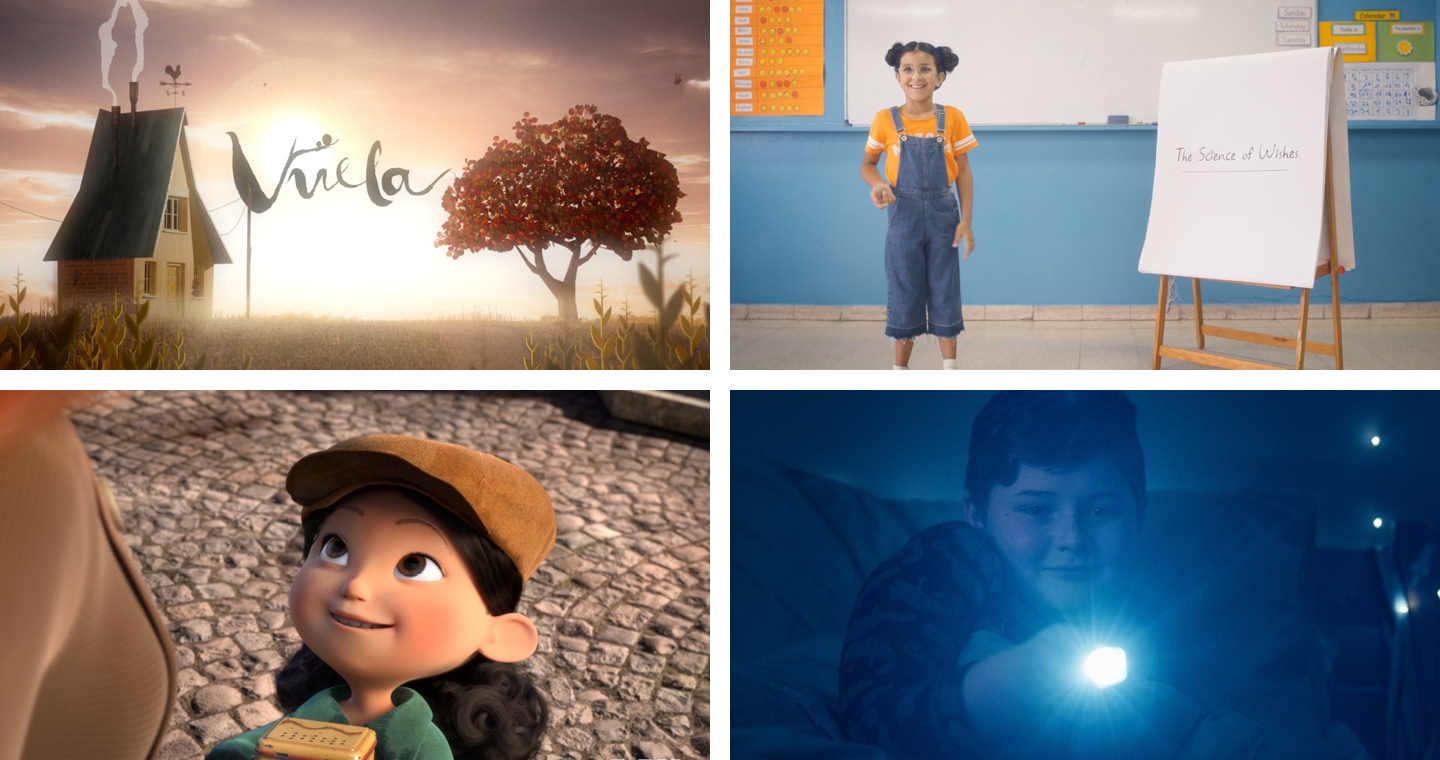After the long list of short films in competition, the jurors chose to award the stories: tales of life, fears, tensions, happiness, sadness, change, obstacles to overcome, prejudices and much more told through a camera. No matter the length of a story, what counts is getting to the heart of the viewer. The strength of some of the themes moved the young jurors who shared their emotions and thoughts with the others like a big family: the Giffoni family.
The winners of the Gryphon Award for best short film in each section were: FLY (Spain, 2020) for the Elements +3 category, the second short film directed by Carlos Gómez-Mira Sagrado, which tells the story of the little bird Fly: he has a deformed wing and cannot migrate. His flock abandons him, but the encounter with Pio-Pio gives him serenity and a purpose in life. THE SCIENCE OF WISHES (Lebanon, 2021) written and directed by Michelle Bado won the best short film award in the Elements +6 section. A little girl presents a science project on a very special topic: her older sister's magical powers, creating turmoil in the classroom and in her family.
The winner of Elements +10 is MILA (USA, 2021) directed by Cinzia Angelini. The poetry that comes from children's eyes manages to make everything less dramatic: during the Second World War, the bombings, death and destruction are told by Mila, a happy and carefree child who suddenly finds herself experiencing the cruelty of war. She does not need to speak, her eyes are able to make the spectator experience the drama of pain and loneliness. Mila is the most significant narration of an innocent soul who hopes to survive and to re-embrace his affections, if only in fantasy.
Little Johnny is at the centre of the short film that wins the Parental Experience category: JUST JOHNNY (Ireland, 2021) directed by Terry Loane, which tells of the child's desire to wear a girl's dress for his first communion, resulting in a family conflict in which the child's only support is his mother.
Special prizes were also awarded this year. The CIAL - Premio Ambiente - Grifone di Alluminio Riciclato award goes to THE RECYCLING MAN (Italy) Screened in the Parental Experience category and written and directed by Carlo Ballauri from Genoa. The film tells the story of the relationship between Jacob, who is immobilized in a wheelchair, and Sarah, a girl his age, whom he spies on with binoculars. One day someone comes up behind the girl with a screwdriver and Jacob will do anything to save her. Although the theme of recycling materials, particularly metal, is presented, it invites us to reflect on the possible consequences of human behaviour
The LETE SPECIAL AWARD - Sport and Social Cultureva to MICA (Morocco-France-Qatar) directed by Ismael Ferrouhki in competition in the Elements +10 category. The passion for sport and the will to succeed are the central themes of a film. Acqua Lete has decided to establish the Special Award Sport and Social Culture, because it is convinced that sport is a phenomenal incubator of social values able to play a key role in the process of activation and dissemination of a new social culture that sees agencies, institutions, federations and companies in team to promote the integration of disabled athletes and ensure a better future for the younger generations living on the margins of society. The prize is awarded to MICA for the way the director expresses social redemption through sport.
The CLEAR CHANNEL - Creativity and Innovation prize was awarded to the feature film NIGHT FOREST (Germany), directed by Andre Hörmann and winner in the Elements +10 category. The award was given to the director who, in the production of his work, stood out for the use of an innovative cinematographic language and for his distinctly creative style. Clear Channel Italia, which has always been sensitive to environmental issues, has chosen an electric bicycle as its prize to turn the spotlight on eco-sustainability and the climate emergency.
Finally, the ENI prize goes to the second feature film BULADÓ (Caribbean) by director Eché Janga: a film with a mystical atmosphere in which family relationships are broken up, developed and then resolved three generations apart. The film won for its ability to address the theme of the specificity of individuals and the difficulties that often exist in dialogue between different generations. It succeeds in synthesising the value of inclusion as a means of overcoming personal limits in favour of a mediation between different cultures and interpretations of reality, making them a lever of enrichment and growth.
Three prizes were awarded to CGS (Cinecircoli Giovanili Socioculturali) - Percorsi Creativi 2021. For the Generator +13 section, the prize went to the film VACARME (directed by Neegan Trudel - Canada) because it highlights the impossibility of growing up peacefully in a problematic family environment without affection, with a mother who is the victim of her own unsatisfaction and loneliness, and who cannot contain the anger of the main character, 13-year-old Emilie. Using a classic language, the film emphasises, through frequent close-ups and details of significant objects, the importance of the discovery of the guitar, to which the protagonist clings in moments of greatest tension, the only way out and possibility of redemption. The constant presence of snow seems to want to cover discomforts and conflicts, in a fluid and meaningful story with an educational theme.
The winner of the Generator +16 section is THE FAM (directed by Fred Baillif - Switzerland) because it offers a realistic and problematic point of view on MIF, but also a rich opportunity to build relationships based on the choice of taking care of others, beyond blood ties. The complex work of direction, which has chosen a narrative structure that is mainly non-linear, with 'interlocking' chapters, allows the story to manage the temporal planes in an original way, gradually revealing to the viewer the fragilities of the protagonists. The hybridisation between Fiction and Documentary is enhanced by the involvement of the girls, who give back real life stories well constructed in the director's script.
Lastly, the award went to the feature film NINJABABY (directed by Yngvild Sve Flikke - Norway) because it touches on current and youthful issues, dealing with a delicate theme with depth and lightness, without falling into moral judgments, exalting the individuality of the characters and their way of dealing with the crucial choices of life. The narration is made fresh and original by the use of animation, a characteristic element of the work, through which the conflicts and the creative interiority of the protagonist emerge. This makes it possible to involve a heterogeneous audience, encouraging the viewer's identification. The skilful use of framing and photography, set design, costumes and soundtrack punctuates Rakel's growth and the evolution of the characters.
Saturday, 31 July 2021 19:12
At #Giffoni50Plus the world belongs to young people also thanks to art: the winning short films and the special awards
MORE NEWS
December 01, 2023
Category: News Giffoni Experience
Announced on Giffoni Day the theme of the 2024 festival and of all the activities to be held throughout the year: "The Illusion of Distance"
December 01, 2023
"Children meet the Pope" and share their hopes and worries with him: great emotion for the 54 giffoners in Rome
Category: News Giffoni Experience
A crowd of seven thousand young people from 84 countries met with Pope Francis at the Vatican on Monday, November 6, to share "their hopes and concerns about the future".
Dec 01, 2023
The Young Audience Film Weekend marked by thrills and passion
So many young people crowded the Sala Galileo in the Multimedia Valley to attend a film…
Aug 07, 2023
#Giffoni53: all the numbers of a uniquely successful edition
Numbers often tend to provide a cold analysis of an event. But as far as Giffoni is…
Jul 30, 2023
Winners and Prizes Giffoni 2023
The 53rd edition of the Giffoni Film Festival, dedicated to the theme of INDISPENSABILI,…
Jul 29, 2023
Gubitosi weights on #Giffoni53: “A wonderful experience in a place called happiness”.
“A wonderful experience and a great success in a place called happiness”: with these…








